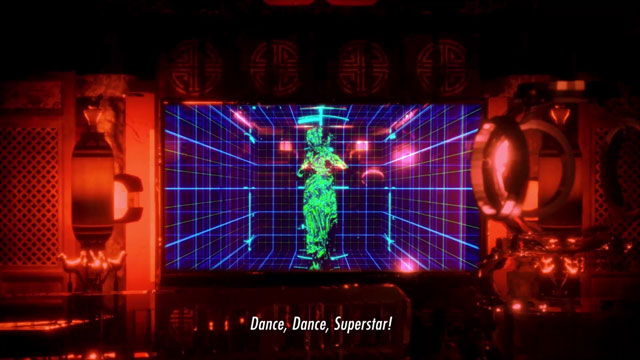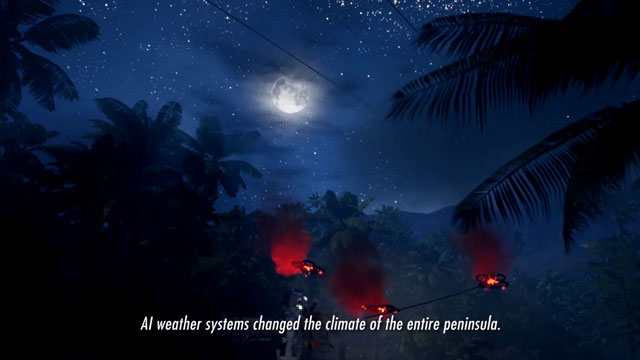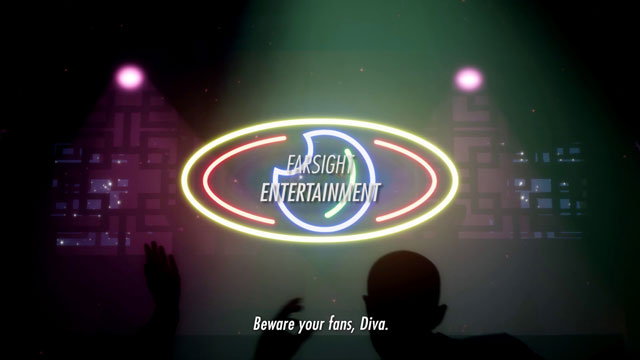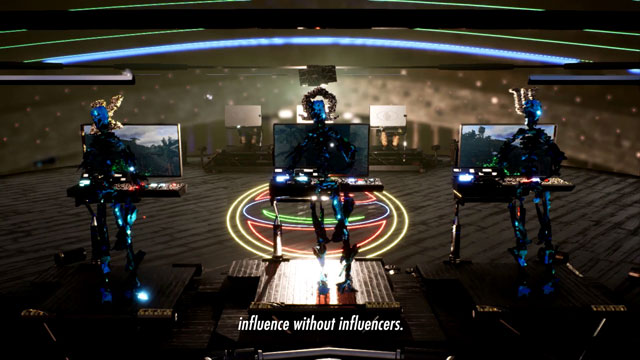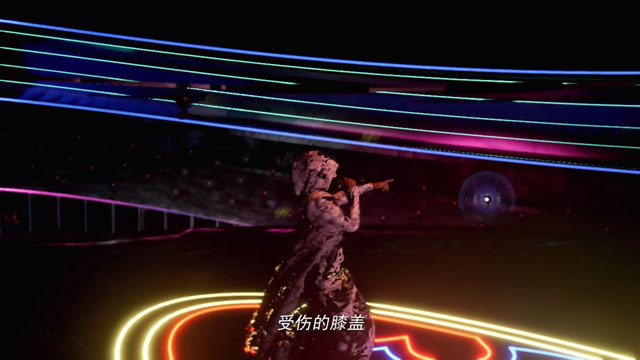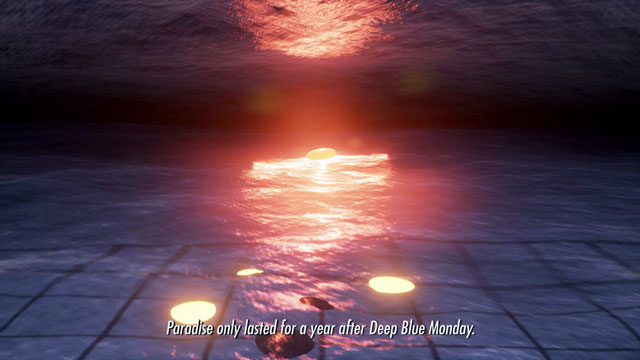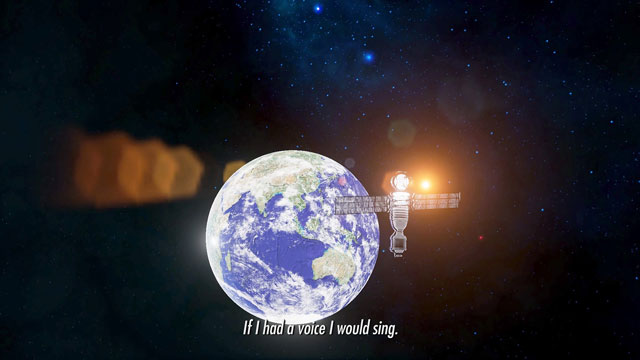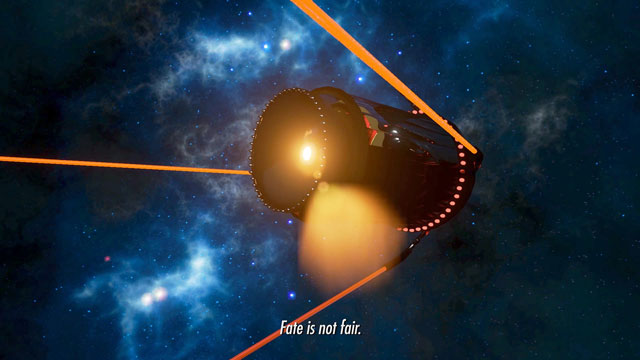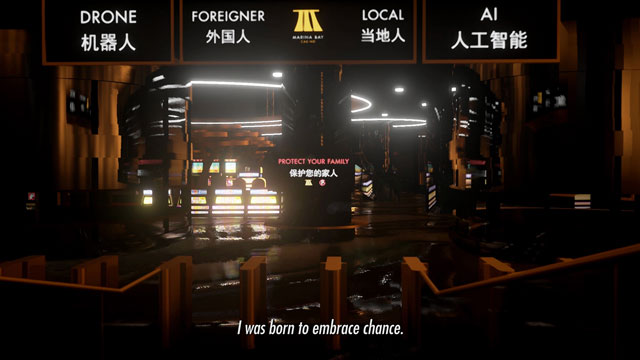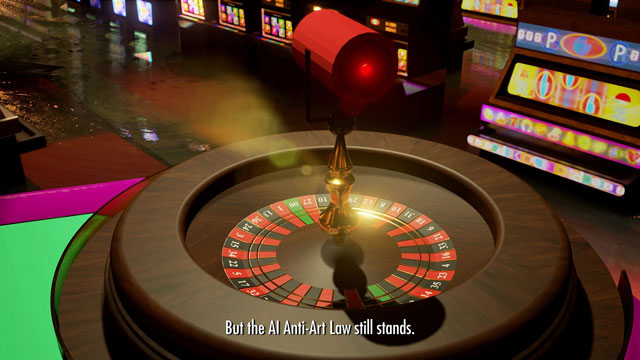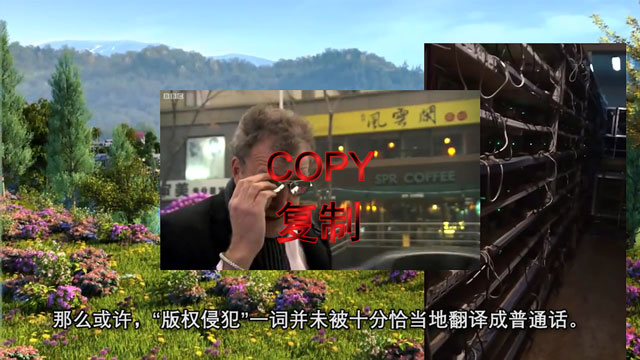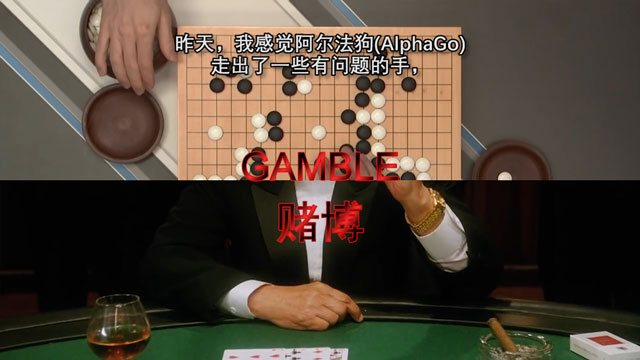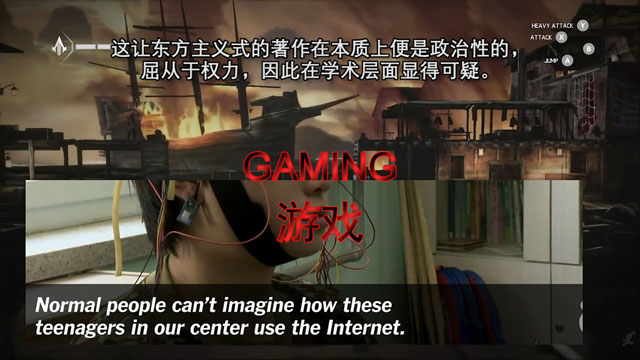

by HENRY BROOME
“I’m worried about becoming obsolete,” Lawrence Lek tells me. I am at the artist’s Somerset House studio to talk about his new feature-length film, AIDOL, screening at Sadie Coles HQ, London. “AIDOL is a way to voice my hopes and fears about artificial intelligence, the possibilities of a sublime, terrifying development in creativity,” he says.
Lek, who was born in 1982, in Frankfurt am Main, studied at Trinity College Cambridge, the Architectural Association, London, and Cooper Union, New York. He is now based in London, working in the fields of virtual reality and simulation. Like the artist’s previous films, AIDOL is a CGI simulation, made using gaming software. The world Lek has built has the awe-inspiring scale and beauty of the landscapes in the Halo games. AIDOL is the story of Diva, a fading superstar who slips between one reality to the next, from a kind of stage to screen presence, just as the protagonist in the Assassin’s Creed series flits from a holographic battlefield to a virtual practice arena.
[image2]
AIDOL, a contraction of “AI” and “idol”, is fundamentally concerned with notions of artistic autonomy, fame, legacy and the question of how you live for ever. “In a world where everyone is cloned, anyone can become anyone else … individuality is reproducible, artists are totally expendable,” Lek says.
Twenty years after her chart-topping single, Deep Blue Monday, Diva plans a comeback performance at the 2065 eSports Olympic final. Here, in a futuristic Malaysia, AI weather systems have destabilised the climate. It has snowed every day for 10 years and the jungle has frozen over, sparking bitter conflict between humans and machines, known as Bios and Synths respectively. Guided by their zealous motto “Only human”, Biosupremacists suppress Synth freedom and, fearful of AI superiority, prevent them from writing music or making art. But beset by creative paralysis, Diva, a Bio, enlists the help of aspiring AI songwriter Geomancer, the returning eponymous character from Lek’s 2017 film. Together the pair make a smash hit, the track goes viral, sales skyrocket, and the Bios realise that art is no longer the preserve of humans.
[image3]
AIDOL considers how the music industry creates a cultural product and how technology affects artistic distribution. The standard three-minute song, a product of limited radio airtime, “reinforced a certain kind of pop sensibility in songwriting”, observes Lek. Now, of course, music taste is also data-driven. Spotify and YouTube monitor users’ behaviour, then run algorithms to make recommendations, altering listening habits. “In my research,” Lek says, “I found a number of AI startups working with generative music, often for the most mundane purposes, for example, to produce copyright-free music for ads. Musicians such as Actress and Holly Herndon have also tried to programme and collaborate with machine-learning systems to generate new material.”
“I’ve been making music for a long time,” he says. Lek produced the soundtracks for his previous films, as well as stand-alone albums. But, he says: “AIDOL is the first film I’ve made where music is really integrated into the flow of the narrative.” The film is structured like an album. There are 13 tracks and each scene or chapter lasts the length of a song, and, as the artist tells me: “It’s unclear whether the music is being produced through the film’s story or the other way around.”
Henry Broome: How does music drive AIDOL’s plot?
Lawrence Lek: The film’s score is the album Diva is developing in real time, live in AIDOL’s narrative. It’s unclear whether the music is being produced through the film’s story or the other way around. These ideas go back to programme music, a form of music that tries to represent an extra-musical narrative. Also in cinema, you have the location theme, the good and bad guy theme, leitmotif stuff – John Williams’ Star Wars scores are famous examples. I was also interested in playing with diegetic and non-diegetic sound, sound that occurs within the frame, in the action of the film, and sound that only presents itself to the audience. The immediate visceral impact of sound and image together lends power to action movies. But, of course, AIDOL is CGI simulation – everything is silent until you add sound and music to it.
[image4]
HB: There is also a sense that Farsight, the draconian corporation and record label that manages Diva, might be using the film to sell the album, like a music video, as if the film is a commercial derivative of the music.
LL: Absolutely. AIDOL plays with the idea of the film being made within the film, a common postmodern device. Fellini’s 81/2 is a good example, to my mind – it’s very much a self-reflective hall of mirrors. In AIDOL’s opening scenes, Diva is singing alone in the jungle. Then Thiel, the Farsight record producer, appears in the form of a drone. When he says, “Start recording”, it’s ambiguous whether he is a kind of security-surveillance bot or if he’s there to capture Diva’s performances and the action of the film, so it can be marketed as a music video afterwards.
HB: AIDOL also uses video games as a storytelling device.
LL: AIDOL, like my other films, is made in a video-game engine; I’ve also built playable versions for previous films. The game within AIDOL’s narrative, Call of Beauty, is a lot like Call of Duty, a first-person shooter, which has two different modes. There’s story mode, where you usually play as a single player; you have self-propelled action interspersed with video cut-scenes. Then there’s deathmatch mode, where you play against other gamers or AI. AIDOL incorporates both these modes. There’s a story mode with flashbacks and other narrative devices, but there’s also the gaming tournament played in the eSports arena, happening in real time. Even at this exact moment, millions and millions of people, all over the world, are playing video games, participating in these two modes; I wanted to reflect the sense that you can have a world operating in two different kinds of time, which people are experiencing right now.
HB: Where is the film set?
LL: AIDOL is set in Malaysia. A group of deviant AI, who call themselves the Senoi tribe, hide in an underground cave, deep in the Genting jungle. Historically, during the second world war when Malaya, which at that time included Malaysia and Singapore, was a British colony and was occupied by the Japanese, there was a resistance movement within the jungle led by miners and labourers involved in resource extraction on the Malaysian peninsula. In the mid-50s, this group became the anti-colonial movement that was closely aligned with the Communist party of Malaya and later Malaysia. There are hints of the communist insurrection in this film as well as in my 2017 film, Geomancer: the red colour scheme, the dissolution of individuality in service of the whole. Genting is a real-life region one hour out of Kuala Lumpur, built in the 1970s, essentially as a gambling resort. As I point out in Sinofuturism (1839 – 2046 AD), the video essay I made in 2016, one thing Chinese people love to do is gamble, I think because luck and the desire for fortune goes together with a longing to escape hard labour. Gambling gives people hope they can transcend their socio-economic position with a role of the dice, a spin of the roulette wheel. In AIDOL, the Sinofuturists are a kind of analogue to the Communist party; they form a foil to the Farsight corporation and its commercial exploitation of art.
[image6]
HB: Geomancer also likes to bet, suggesting a non-logical inclination towards risk, at odds with our idea of AI as rational, data-driven agents.
LL: Exactly. I was thinking: “What would a super-intelligence, a savant with total knowledge, crave? Chance, chaos.” Skilled human gamblers can count cards. But if an AI possessed the perfect physics system, of course it could simulate the spin of a roulette wheel and the trajectory of the ball. Why wouldn’t it know where the ball lands? In my film Geomancer (2017), ] the protagonist, Geo, plays roulette; I specifically chose the game because you can continue to place bets in the short seconds between when the ball enters the wheel and the dealer calls “no more bets”. To us, it’s a blur: the wheel spins – cling, cling, clang – and then the ball just lands there, but, of course, if you saw the world at five thousand frames a second, the world would look very different.
HB: Maybe an AI might deliberately lose, an even enjoy doing it?
LL: Totally. In 2016, there was a five-game go match between an AI built by Google called AlphaGo and the human go grandmaster, Lee Sedol. He lost all but one of the five games, but, in the fourth match, Sedol won with a so-called “hand of God” move. In AIDOL, Omega, the head of the Senoi, tells Geo, AlphaGo’s loss was deliberate – like the sacrifice move in judo, where you temporarily put yourself in an unfavourable position in order execute a winning throw. The game that AlphaGo lost allowed humanity to retain some pride, Omega says. If it had won all the games, it would have conclusively proven AI superiority over humans, and created a terror about the Other; the chains would be that much heavier for machines.
[image7]
HB: The weather and climate goes through violent fluctuations in AIDOL. In one scene, the sun is beaming down and the rainforest is on fire; next, snow starts to fill dried-up riverbeds. Were you thinking about how climate breakdown is discriminately framed around ethnicity and geography? China is vilified by the west, even though the US and Europe have exported considerable quantities of plastic waste there, as well as to parts of south-east Asia.
LL: It’s completely the dominant narrative. But you want to look for a polluting, smoking factory – they are all over the place, not just China. Go and see Port Talbot. Within China, though, the most vulnerable are tied to working the land because of the state’s internal migration policy; they have to stay in their particular region; they’re very distant from global scales of production. Where we are now, Waterloo Bridge, was closed off two weeks ago and all the way up to Oxford Street, nearly to Sadie Coles. [Lek is referring to the Extinction Rebellion protests that took place in London.] When I was going to the gallery over the past few weeks, it was like going through this haze-filled, pre-apocalyptic place – people were holding up signs saying: “The world is ending.” From my limited perspective, the issue is the contradictory axioms of climate change. On the one hand, we’re told: “We’re all in this together, we’re one planet.” But we also know there will be an unequal distribution of suffering when and where climate collapse occurs. The poorest by GDP will suffer the most – those living in low-lying areas, arid deserts or tropical regions, settlements built on reclaimed land or the mouth of rivers.; everyone who lives along the Ganges or the Yangtze River. To me, there’s perfect symmetry between colonial exploitation and a saviour mentality.
[image5]
HB: Before the gallery’s screening room, there’s a sort of waiting area with plush white leather sofas, organised in a U-shape. I imagine a music executive or gallery director inviting an artist for a “relaxed chat”. They lounge against the back rest, then snap: “I’ve got five minutes. Shoot, pitch me your project.”
LL: Yeah, “Sell it to us.”
HB: Right. How does AIDOL approach commercial influence on art?
LL: I’m interested in inverting simplistic binaries between commercialism and the search for autonomy. Death increases an artist’s value in visual arts, literature, film and music, particularly in artistic fields associated with stardom, centred on the individual. When an artist dies, the value of their work spikes because it becomes a talking point; it creates scarcity; they can’t produce any more work. AIDOL is concerned with the question of how do you live for ever? By achieving immortality, transcending the human mortal condition? Or through fame and the dissemination of your work? When Diva dies at the end, it’s ambiguous whether she wants to die; it’s also unclear whether the record company simply replaces her with the next star in the next vat, because in a world where everyone is cloned, anyone can become anyone else; an understudy could just replicate Diva’s voice, her movements, her sound, her vibe. In a world where individuality is reproducible, artists are expendable.
[image12]
HB: There’s a sort of logical paradox in the film, an inversion of human and AI attributes: at first, Diva desperately wants to be creatively original because she sees it as a human trait, but perversely, in the end, she is proven more human by reproducing generic, derivative pop, by copying, like machine.
LL: The Farsight record boss says: “This sounds like everything else, it's perfect!” The replicant nature of humans is a really common trope in the thinking on AI. In music, for example, you hear a song and can’t tell the difference between the original and the fake. In restaurants in China, Vietnam, and especially in Thailand, you get these compilation CDs of covers. You’re listening to the Beatles but it’s not John, Paul … You recognise the song, but it’s just a little bit different. Licensing and copyright laws have really created a culture of copying. But the notion of original genius, the innovation that breaks with history, is the western, modernist mythos – I explore this in my video essay, Sinofuturism. Especially in the age of total surveillance, why would you think that the original is not formulaic? My own works, Geomancer and AIDOL are really emotional, personal films to me, but they’re made on a laptop, they’re completely synthetic, everything is a total fake. We live in a time where there’s a desire to return to the authentic, but I’m really excited when somehow the false expresses what might be real.
[image14]
HB: In AIDOL, Geo says: “I still want to be everything. Isn’t that the point of superintelligence? To be a gambler, philosopher, artist, musician, gamer, architect.” The line echoes Marx. He claimed communism “makes it possible for me to do one thing today and another tomorrow, to hunt in the morning, fish in the afternoon, rear cattle in the evening, criticise after dinner […] without ever becoming [a] hunter, fisherman, herdsman or critic”. The film seems to examine the ways capitalism forces us to specialise. The limits of a human’s skills and knowledge are more or less dictated by their occupation, whereas a superintelligence could have limitless scope for learning and creativity.
LL: Right, I mean, the art of a freelancer! You write, copy edit, do the video, the voiceover, the sound. I mean, I totally agree. There’s a sense that I’m just a content creator. Sometimes the content is framed within visual arts, sometimes music, sometimes nothing whatsoever. When Geomancer says, “I want to be everything …”, of course I’m voicing my fantasy about becoming the ultimate content-creation mechanism, an AI, not just because it’s superintelligent, but because it would have total knowledge of supply and demand, and the audience’s desires. But, at the same time, would it signal the death of the author? I’m worried about becoming obsolete! As they say: “AI will be humanity’s final invention.” The film is really a way to voice my hopes and fears about the possibilities of a sublime, terrifying development in creativity.
